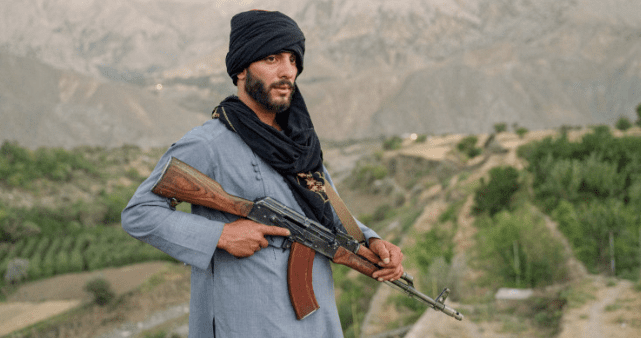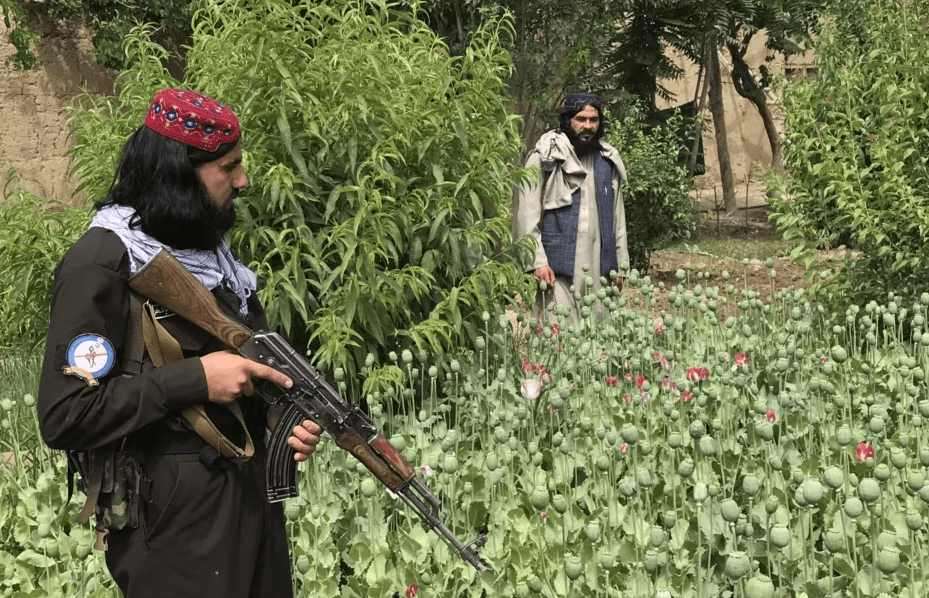Abdul strikes the heads of the poppies as hard as he can while holding an AK-47 assault weapon on his left shoulder and a long stick in his right hand. The stalks and sap from the poppy bulb both flutter in the air, emitting the characteristic, strong aroma of opium in its unprocessed state.

Abdul and a dozen other men quickly destroy the poppy crop that had covered the small field. The armed men then board a pickup truck and proceed to the following farm while donning shalwar kameez (a traditional Afghan tunic with loose-fitting trousers), the majority of whom have long beards.
We were given a rare opportunity to accompany the guys on one of their patrols to destroy poppy farming. The men are members of a Taliban anti-narcotics unit in the eastern Nangarhar region of Afghanistan. The men were insurgency combatants who were engaged in a conflict to grab control of the nation less than two years ago. Now that they have prevailed, they are dominating and carrying out their leader’s commands.

Haibatullah Akhundzada, the supreme leader of the Taliban, issued a directive in April 2022 outlawing the cultivation of the poppy, which is used to make opium, a key component of the drug heroin. Anyone breaking the law would have their pitch destroyed and face Sharia-compliant penalties.
A Taliban spokesman told the BBC that the prohibition was put in place because it violates their religious beliefs and is necessary to prevent the spread of opium, which is obtained from poppy seed capsules. More than 80% of the opium in the world used to be produced in Afghanistan. In Europe, opium from Afghanistan accounts for 95% of the heroin sold.
The Jorunalist has now travelled to Afghanistan and used satellite analysis to investigate the impact of direct action on the cultivation of opium poppies. The Taliban commanders seem to have had more success than anybody else in eradicating farming.
We discovered a sharp decline in poppy growth in the main opium-producing areas; according to one expert, yearly cultivation may be 80% lower than previous year. Poppies have been replaced with less lucrative wheat crops, and many farmers are experiencing financial hardship.
In order to view the situation firsthand, we journeyed to the provinces of Nangarhar, Kandahar, and Helmand. We rode on muddy, winding roads and walked miles across agriculture and rocky terrain.
Taliban destroyed an opium field

The 2022 opium harvest, which climbed by a third over 2021, was exempt from the Taliban directive, according to the United Nations Office on Drugs and Crime (UNODC).
But this year is a lot different. The data we observed on the ground is supported by aerial photography.
David Mansfield, a recognised authority on the drug trade in Afghanistan, collaborates with Alcis, a UK company that specialised in satellite analysis.
“Cultivation is probably going to be less than 20% of what it was in 2022. According to him, the scale of the reduction will be unprecedented.
Despite the fact that most farmers have cooperated with the restriction, Taliban insurgents have been damaging their crops.
The leader of the Taliban patrol unit we are with in Nangarhar, Toor Khan, informs us that his forces have been razing poppy fields for almost five months and have removed tens of thousands of hectares of the crop.
As the Taliban squad burns her poppy crop, one lady yells passionately, ‘You’re ruining my field, God kill your home’.
“I ordered you to destroy it yourself this morning. Toor Khan responds in a yell, “You didn’t, so now I have to. She withdraws within.
The Taliban kidnap her son, who is eventually freed after receiving a warning.
Toor Khan (right) and other Taliban men demolish a field of poppies.
Because there have been incidents of resistance from irate people in this region, the Taliban travel in large numbers and with weapons. During the eradication effort, at least one civilian was murdered in a gunshot, and there have been allegations of other violent conflicts.
Farmer Ali Mohammad Mia is watching the unit damage his land with a shocked expression on his face. When the poppies are finished, the ground is covered with pink flowers, green bulbs, and broken stems.
We wonder why he continued to grow poppies against the law.
What else would you do, he asks, “if you don’t have food at home and your kids are starving?” “Our land doesn’t have a lot of space. We could only earn a small portion of what we could from opium if we planted wheat on them.
Farmers like Ali Mohammed Mia are forced to produce less expensive crops like wheat since the cultivation of poppies is illegal.
The speed with which the Taliban do the task using only sticks is impressive. In a little more than 30 minutes, six fields, each measuring 200 to 300 square metres, are cleaned.
We enquire of Toor Khan how they feel about eliminating a means of subsistence for their own starving population.
“Our captain gave the order. We are so devoted to him that if he instructed my friend to hang me, I would do what he says and give myself over to him, he claims.
Afghanistan’s opium heartland, where more than half of the nation’s opium was produced, used to be Helmand province in the southwest. To see for ourselves how it now seems, we visit there independently of the Taliban’s anti-narcotics team.
When we visited the province last year, we observed vast areas of land covered with poppy farms. This time, not a single crop field could be seen.
According to Alcis’ study, Helmand’s poppy cultivation has decreased by more than 99%. According to David Mansfield, poppy production in the Helmand province has decreased from 129,000 hectares the year before to fewer than 1,000 hectares currently.
We come across farmer Niamatullah Dilsoz while he is harvesting wheat in the Marjah area, which is south of Lashkar Gah, the capital of Helmand. He cultivated poppies in the same field last year. He claims that farmers in Helmand, a Taliban stronghold, have mostly abided by the prohibition.
Some farmers attempted to plant poppies in their courtyards while hiding them behind walls, but the Taliban learned about this and destroyed those fields.,”
Says Niamatullah.

The only sounds coming from the farm are the birds chirping and the sound of the wheat stalks being chopped. The field served as a front line throughout the conflict. UK forces had a base in Helmand, where they engaged in some of their bloodiest combat.
He is in his early twenties, Niamatullah. For the first time in his life, he ventures outside without worrying about getting hit by a bomb. The opium embargo, however, has dealt a devastating blow to a population already traumatised by a protracted conflict, coming at a time when Afghanistan’s economy is collapsing and nearly everyone is living in poverty. The source of their next meal is unknown to two thirds of the population.
“We are furious. We now make less money from wheat than we did from opium,” he claims. “I am unable to provide for my family. I was forced to take out a loan. There is a severe food shortage, and the government is doing little to help.
The wheat Niamatullah now raises in place of poppies is harvested.
We inquire about the Taliban government’s efforts to assist citizens from Zabiullah Mujahid, its principal spokesperson.
“We are aware of how destitute and distressed individuals are. But opium caused more damage than good. Out of a total population of 37 million, 4 million of our people were addicted to drugs. That’s a significant sum, he remarks. “We want the international community to help Afghans who are experiencing losses by providing them with alternative sources of livelihood.”
He disputes claims made by the US, the UN, and other nations that the Taliban relied heavily on opium sales to finance its campaigns of violence against Western soldiers and the previous Afghan government.
How can they expect aid from foreign organisations when the Taliban government has put their financing and operations at risk by forbidding women from working for any NGOs, is the question we pose.
Mujahid responds, “The international community should not equate political and humanitarian issues.” Opium has an adverse effect on the entire world, not just Afghanistan. It is only right that Afghans get assistance in return if the world is protected from this terrible scourge.
The US spent enormous sums of money in Afghanistan to combat opium cultivation and trafficking in the hopes of reducing the Taliban’s income.
They conducted raids on drug manufacturing facilities, burned opium supplies, and carried out airstrikes on opium fields in Taliban-controlled areas.
However, the BBC observed opium growing openly in regions under the administration of the US-backed previous Afghan regime before to the Taliban takeover in 2021.
For the time being, the Taliban seem to have succeeded in Afghanistan where the West failed. However, it is uncertain how long they can maintain it.
According to Mike Trace, a sharp decline in opium cultivation in Afghanistan is likely to change the sort of drugs used, which might have an impact on the prevalence of heroin addiction in the UK and the rest of Europe. People frequently use synthetic narcotics, which can be even worse than opium.

